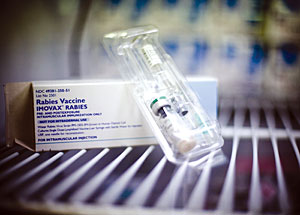 |
Human rabies is a fatal illness. Unfortunately, about 80 per cent of the world's human rabies cases (about 30,000 annually) occur in South Asia. Rabies is transmitted most often through animal bites, although other contact with the saliva or brain tissue of an infected animal can cause the disease as well. In Nepal, the most commonly infected animal that transmits rabies to humans is dogs. Cats come a distant second, simply because they aren't popular as pets. Whoever said our capital should be renamed Dogmandu instead of Kathmandu had the right idea, at least in terms of rabies.
Children are especially vulnerable to rabies simply because they may be bitten or nicked by a rabid dog and not mention this to anyone. This may be fatal because after a usual incubation period of about a week to two months, the child may come down with rabies, by which time it is too late. It is clear that rabies is under-diagnosed in the developing world. And not all cases of rabies manifest with hydrophobia (fear of water) and the terror-stricken behaviour we are used to hearing about in popular culture!
So what can be done? Prevention, of course. Taking care of stray dogs would be a great idea, but this undertaking seems to lack political backing. The second best thing is to consider being properly vaccinated with human rabies vaccines which are available (at a price) mainly around the Teku Hospital area in Kathmandu. In the case of a bite, regardless of prior (pre-exposure) vaccination, the wound needs to be cleaned properly, daily, with liquid iodine or soap and water, as the virus hangs around the bitten area for a long time. A 'top off' shot or two to boost immunity will be required even if prior vaccinations have been taken. If prior vaccinations have not been taken, and especially if the bite is severe, then immunoglobulin (a kind of 'prompt response' medicine) needs to be administered. Immunoglobulin may be available in the Teku Hospital area again, but supply tends to be erratic. Hence 'pre-exposure' vaccination is best. Luckily, after a bite by a potentially rabid animal, the Nepali government does usually administer rabies vaccinations for free at Teku Hospital.


